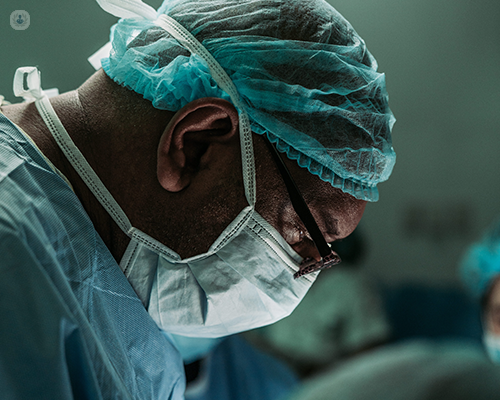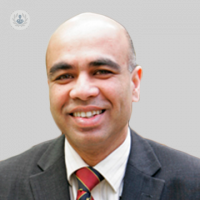Transoral robotic surgery (TORS): an exciting advance in mouth cancer treatment
Escrito por:Transoral robotic surgery (TORS) is proving to be a less invasive and safer method of treating mouth cancer compared to traditional methods. As a result, this exciting and new advance in technology is improving surgical outcomes for many patients.
Mr Mriganka De is one of the few head and neck surgeons in the UK with expertise in transoral robotic surgery. Learn from him about this procedure, who is most eligible for it and more.

What is transoral robotic surgery?
Transoral robotic surgery (TORS) is a form of minimally invasive surgery. It’s used in the treatment of throat cancer such as tonsil, tongue and laryngeal (voice box) cancers.
The technique involves surgeons controlling the robot from the console and operating with precision, ultimately significantly reducing risk and improving the outcome for the patient.
Which patients are most suitable for TORS?
TORS is primarily used for small to moderate size tonsil and tongue-based tumours that are caused by the human papillomavirus (HPV). HPV-related throat cancers are more common among middle-aged, healthy patients. The robotic practice is evolving with time. They are now used for other head and neck operations e.g. thyroidectomy, parathyroidectomy and surgeries for parapharyngeal tumours.
How does TORS compare to the traditional way of performing oral cancer surgery?
TORS is a minimally invasive surgical technique that is performed through the mouth and leaves no scar. In contrast, traditional surgical techniques involve a large scar, lip split and splitting of the jaw bone to access the tumour.
Traditional open surgery takes all day and creates a need for reconstruction, resulting in patients usually staying in the hospital for weeks. Patients can be discharged as early as three days after undergoing TORS.
What are the benefits of transoral robotic surgery?
The main advantages of TORS over traditional surgery are:
- A quicker recovery
- A reduced risk of complications
- Better swallowing function post-op
Furthermore, patients can avoid chemotherapy and radiotherapy in some cases.
Do many specialists in the UK currently perform transoral robotic surgery?
TORS has become standard practice in large centres across Europe and the rest of the world. Results have been very good in appropriately selected patients. It has become part of multinational prospective trials and some of the mid-term results are very encouraging.
Are there any risks of having TORS surgery?
As with any surgery, there are risks associated with TORS. There are risks of bleeding and infection, as well as a small risk of the airway being compromised. However, we take all possible steps to minimise risks.
Visit Mr Mriganka De’s profile to get in touch and discover how his surgical expertise can help you.


